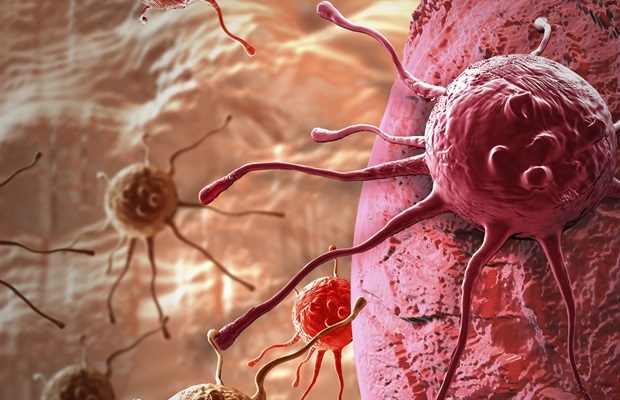

New trial shows promise of combination neoadjuvant immunotherapy for lung cancer
Patients with stage 1–3 non-small cell lung cancer (NSCLC) given a combination immunotherapy prior to surgery (neoadjuvant) had a better major pathological response (10% or less residual cancer) when the cancer was removed than those who took a single immunotherapy agent alone, according to results of a novel multicenter phase 2 NeoCOAST platform trial that included two investigators from the Johns Hopkins Kimmel Cancer Center and its Bloomberg-Kimmel Institute for Cancer Immunotherapy. The results were published online Sept. 14 in Cancer Discovery, a journal of the American Association for Cancer Research.
In the trial, 84 patients with stage 1–3 NSCLC at 17 study centers across seven countries received a single infusion of the anti-PD-L1 immunotherapy durvalumab either alone or in combination with one of three other immunotherapy agents in development that may further augment the anti-tumor response: oleclumab, monalizumab and danvatirsen. Durvalumab is a drug already approved for more advanced-stage NSCLC that stimulates the immune response to cancer.
Among participants, 27 patients received durvalumab alone, 21 received durvalumab plus oleclumab, 20 received durvalumab plus monalizumab, and 16 received durvalumab plus danvatirsen. Treatment was administered over a four-week period prior to surgery. Major pathological response rates were seen in 11.1% of patients receiving durvalumab alone (3 of 27 patients); in 19% of patients receiving durvalumab plus oleclumab (4 of 21 patients); and in 30% of patients receiving durvalumab plus monalizumab (6 of 20 patients).
Overall, the results from this trial, the first platform trial examining cutting-edge therapies prior to surgery for lung cancer, illustrate that targeting multiple cancer pathways through therapy may be superior to a single therapy, the authors say. They also support the evaluation of other immune-modulating agents with different mechanisms of action in combination with anti-PD-L1 therapy for operable lung cancer.
There's a whole host of novel immunotherapy agents being developed in lung cancer and other tumor types for advanced disease, but the evaluation of those drugs for treatment of earlier-stage disease has been very slow. The trial was successful, and demonstrated that patients who received the novel combinations of durvalumab with monalizumab and durvalumab with oleclumab had higher levels of response, where the tumor had regressed by the time of surgery. We're hopeful that these types of trials will allow us to expedite development of new treatments for earlier-stage lung cancer."
Patrick Forde, M.B.B.Ch., senior study author, co-director of the upper aerodigestive malignancies division at the Johns Hopkins Kimmel Cancer Center, associate member of its Bloomberg~Kimmel Institute for Cancer Immunotherapy, and associate professor of oncology
Based on these results, the investigators have started another study called NeoCOAST-2 that involves a longer course of neoadjuvant chemo-immunotherapy and additional treatments after surgery.
Johns Hopkins Medicine
Posted in: Medical Research News | Medical Condition News
Tags: Cancer, Cancer Immunotherapy, Cell, Drugs, Immune Response, Immunotherapy, Lung Cancer, Medicine, Non-Small Cell Lung Cancer, Oncology, PD-L1, pH, Precision Medicine, Research, Small Cell Lung Cancer, Surgery, Tumor